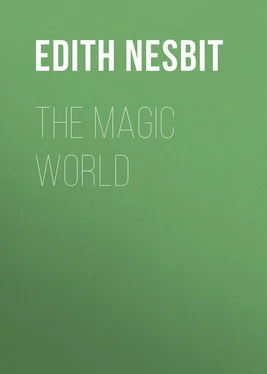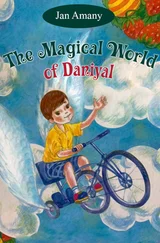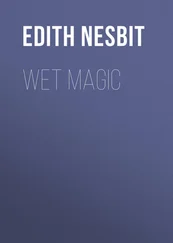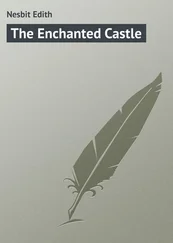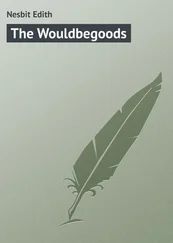Edith Nesbit - The Magic World
Здесь есть возможность читать онлайн «Edith Nesbit - The Magic World» — ознакомительный отрывок электронной книги совершенно бесплатно, а после прочтения отрывка купить полную версию. В некоторых случаях можно слушать аудио, скачать через торрент в формате fb2 и присутствует краткое содержание. Жанр: foreign_prose, на английском языке. Описание произведения, (предисловие) а так же отзывы посетителей доступны на портале библиотеки ЛибКат.
- Название:The Magic World
- Автор:
- Жанр:
- Год:неизвестен
- ISBN:нет данных
- Рейтинг книги:5 / 5. Голосов: 1
-
Избранное:Добавить в избранное
- Отзывы:
-
Ваша оценка:
- 100
- 1
- 2
- 3
- 4
- 5
The Magic World: краткое содержание, описание и аннотация
Предлагаем к чтению аннотацию, описание, краткое содержание или предисловие (зависит от того, что написал сам автор книги «The Magic World»). Если вы не нашли необходимую информацию о книге — напишите в комментариях, мы постараемся отыскать её.
The Magic World — читать онлайн ознакомительный отрывок
Ниже представлен текст книги, разбитый по страницам. Система сохранения места последней прочитанной страницы, позволяет с удобством читать онлайн бесплатно книгу «The Magic World», без необходимости каждый раз заново искать на чём Вы остановились. Поставьте закладку, и сможете в любой момент перейти на страницу, на которой закончили чтение.
Интервал:
Закладка:
And when they got to the place where Edward was, there, sure enough, was Edward, pinned by the hand between a piece of wood and a piece of rock. Neither the father nor the gardener noticed any metal. Edward had fainted.
They got him out; a couple of strokes with the pick released his hand, but it was bruised and bleeding.
They all turned to go, but they had not gone twenty yards before there was a crash and a loud report like thunder, and a slow rumbling, rattling noise very dreadful to hear.
‘Get out of this quick, sir,’ said the gardener; ‘the roof’s fell in; this part of the caves ain’t safe.’
Edward was very feverish and ill for several days, during which he told his father the whole story – of which his father did not believe a word. But he was kind to Gustus, because Gustus was evidently fond of Edward.
When Edward was well enough to walk in the garden his father and he found that a good deal of the shrubbery had sunk, so that the trees looked as though they were growing in a pit.
It spoiled the look of the garden, and Edward’s father decided to move the trees to the other side.
When this was done the first tree uprooted showed a dark hollow below it. The man is not born who will not examine and explore a dark hollow in his own grounds. So Edward’s father explored.
This is the true story of the discovery of that extraordinary vein of silver, copper, and gold which has excited so much interest in scientific and mining circles. Learned papers have been written about it, learned professors have been rude to each other about it, but no one knows how it came there except Gustus and Edward and you and me. Edward’s father is quite as ignorant as any one else, but he is much richer than most of them; and, at any rate, he knows that it was Gustus who first told him of the gold-mine, and who risked being lagged – arrested by the police, that is – rather than let Edward wait till morning with his hand fast between wood and rock.
So Edward and Gustus have been to a good school, and now they are at Winchester, and presently they will be at Oxford. And when Gustus is twenty-one he will have half the money that came from the gold-mine. And then he and Edward mean to start a school of their own. And the boys who are to go to it are to be the sort of boys who go to the summer camp of the Grand Redoubt near the sea – the kind of boy that Gustus was.
So the spy-glass will do some good after all, though it was so unmanageable to begin with.
Perhaps it may even be found again. But I rather hope it won’t. It might, really, have done much more mischief than it did – and if any one found it, it might do more yet.
There is no moral to this story, except… But no – there is no moral.
III
ACCIDENTAL MAGIC; OR DON’T TELL ALL YOU KNOW
Quentin de Ward was rather a nice little boy, but he had never been with other little boys, and that made him in some ways a little different from other little boys. His father was in India, and he and his mother lived in a little house in the New Forest. The house – it was a cottage really, but even a cottage is a house, isn’t it? – was very pretty and thatched and had a porch covered with honeysuckle and ivy and white roses, and straight red hollyhocks were trained to stand up in a row against the south wall of it. The two lived quite alone, and as they had no one else to talk to they talked to each other a good deal. Mrs. de Ward read a great many books, and she used to tell Quentin about them afterwards. They were usually books about out of the way things, for Mrs. de Ward was interested in all the things that people are not quite sure about – the things that are hidden and secret, wonderful and mysterious – the things people make discoveries about. So that when the two were having their tea on the little brick terrace in front of the hollyhocks, with the white cloth flapping in the breeze, and the wasps hovering round the jam-pot, it was no uncommon thing for Quentin to say thickly through his bread and jam: —
‘I say, mother, tell me some more about Atlantis.’ Or, ‘Mother, tell me some more about ancient Egypt and the little toy-boats they made for their little boys.’ Or, ‘Mother, tell me about the people who think Lord Bacon wrote Shakespeare.’
And his mother always told him as much as she thought he could understand, and he always understood quite half of what she told him.
They always talked the things out thoroughly, and thus he learned to be fond of arguing, and to enjoy using his brains, just as you enjoy using your muscles in the football field or the gymnasium.
Also he came to know quite a lot of odd, out of the way things, and to have opinions of his own concerning the lost Kingdom of Atlantis, and the Man with the Iron Mask, the building of Stonehenge, the Pre-dynastic Egyptians, cuneiform writings and Assyrian sculptures, the Mexican pyramids and the shipping activities of Tyre and Sidon.
Quentin did no regular lessons, such as most boys have, but he read all sorts of books and made notes from them, in a large and straggling handwriting.
You will already have supposed that Quentin was a prig. But he wasn’t, and you would have owned this if you had seen him scampering through the greenwood on his quiet New Forest pony, or setting snares for the rabbits that would get into the garden and eat the precious lettuces and parsley. Also he fished in the little streams that run through that lovely land, and shot with a bow and arrows. And he was a very good shot too.
Besides this he collected stamps and birds’ eggs and picture post-cards, and kept guinea-pigs and bantams, and climbed trees and tore his clothes in twenty different ways. And once he fought the grocer’s boy and got licked and didn’t cry, and made friends with the grocer’s boy afterwards, and got him to show him all he knew about fighting, so you see he was really not a mug. He was ten years old and he had enjoyed every moment of his ten years, even the sleeping ones, because he always dreamed jolly dreams, though he could not always remember what they were.
I tell you all this so that you may understand why he said what he did when his mother broke the news to him.
He was sitting by the stream that ran along the end of the garden, making bricks of the clay that the stream’s banks were made of. He dried them in the sun, and then baked them under the kitchen stove. (It is quite a good way to make bricks – you might try it sometimes.) His mother came out, looking just as usual, in her pink cotton gown and her pink sunbonnet; and she had a letter in her hand.
‘Hullo, boy of my heart,’ she said, ‘very busy?’
‘Yes,’ said Quentin importantly, not looking up, and going on with his work. ‘I’m making stones to build Stonehenge with. You’ll show me how to build it, won’t you, mother.’
‘Yes, dear,’ she said absently. ‘Yes, if I can.’
‘Of course you can,’ he said, ‘you can do everything.’
She sat down on a tuft of grass near him.
‘Quentin dear,’ she said, and something in her voice made him look up suddenly.
‘Oh, mother, what is it?’ he asked.
‘Daddy’s been wounded,’ she said; ‘he’s all right now, dear – don’t be frightened. Only I’ve got to go out to him. I shall meet him in Egypt. And you must go to school in Salisbury, a very nice school, dear, till I come back.’
‘Can’t I come too?’ he asked.
And when he understood that he could not he went on with the bricks in silence, with his mouth shut very tight.
After a moment he said, ‘Salisbury? Then I shall see Stonehenge?’
‘Yes,’ said his mother, pleased that he took the news so calmly, ‘you will be sure to see Stonehenge some time.’
Читать дальшеИнтервал:
Закладка:
Похожие книги на «The Magic World»
Представляем Вашему вниманию похожие книги на «The Magic World» списком для выбора. Мы отобрали схожую по названию и смыслу литературу в надежде предоставить читателям больше вариантов отыскать новые, интересные, ещё непрочитанные произведения.
Обсуждение, отзывы о книге «The Magic World» и просто собственные мнения читателей. Оставьте ваши комментарии, напишите, что Вы думаете о произведении, его смысле или главных героях. Укажите что конкретно понравилось, а что нет, и почему Вы так считаете.
